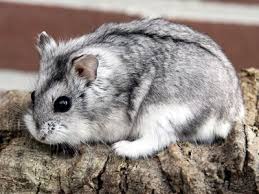
Campbell’s hamster
Campbell’s hamsters prefer a cage with multiple levels and plenty of hiding spots. They enjoy burrowing, so deep bedding is essential.
Useful Fact: Campbell’s hamsters can be kept in pairs or small groups if introduced early, but monitor for any signs of aggression.
Similar to Djungarian hamsters, their diet should consist of seeds, grains, vegetables, and protein sources like insects.
Useful Fact: They are prone to diabetes, so sugary treats should be strictly limited.
Susceptible to diabetes and eye problems, particularly cataracts in older hamsters.
Useful Fact: Keep their diet low in sugar and fat to prevent diabetes and obesity.
Regular cage cleaning is required due to their tendency to hoard food. They groom themselves, but a sand bath can help maintain their coat.
Useful Fact: Campbell’s hamsters can be territorial; ensure their cage is large enough to prevent disputes if housed together.
They can be tamed with regular handling, though they are more prone to biting than some other species.
Useful Fact: Start handling them from a young age to reduce the likelihood of aggressive behavior.
Campbell’s hamsters enjoy tunnels, wheels, and toys they can chew and hide in.
Useful Fact: Providing a variety of toys helps prevent boredom and stress, which can lead to behavioral issues.
Ensure their environment is free from hazards like sharp objects or escape routes.
Useful Fact: Avoid housing them with other species, as this can lead to aggression and stress.
A solid running wheel, tunnels, chew toys, and a sand bath.
Useful Fact: Adding different levels or platforms to their cage can provide additional enrichment.
Can be social with their kind if introduced properly but monitor for signs of fighting.
Useful Fact: Regular human interaction is important to keep them tame and reduce stress.
Use a secure, well-ventilated carrier with familiar bedding.
Useful Fact: They can be sensitive to changes in their environment, so keep travel to a minimum and ensure they feel safe.
Campbell’s hamsters are more aggressive and territorial compared to other dwarf species, but they can be tamed with patience.
Useful Fact: Understanding their territorial nature can help in preventing fights if housed together.
Usually legal to own without restrictions, but check local regulations, particularly regarding breeding.
Useful Fact: Ensure you’re aware of any local regulations on exotic pets if you’re considering breeding or selling them.




